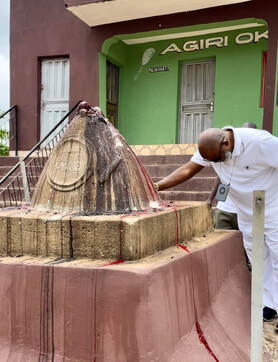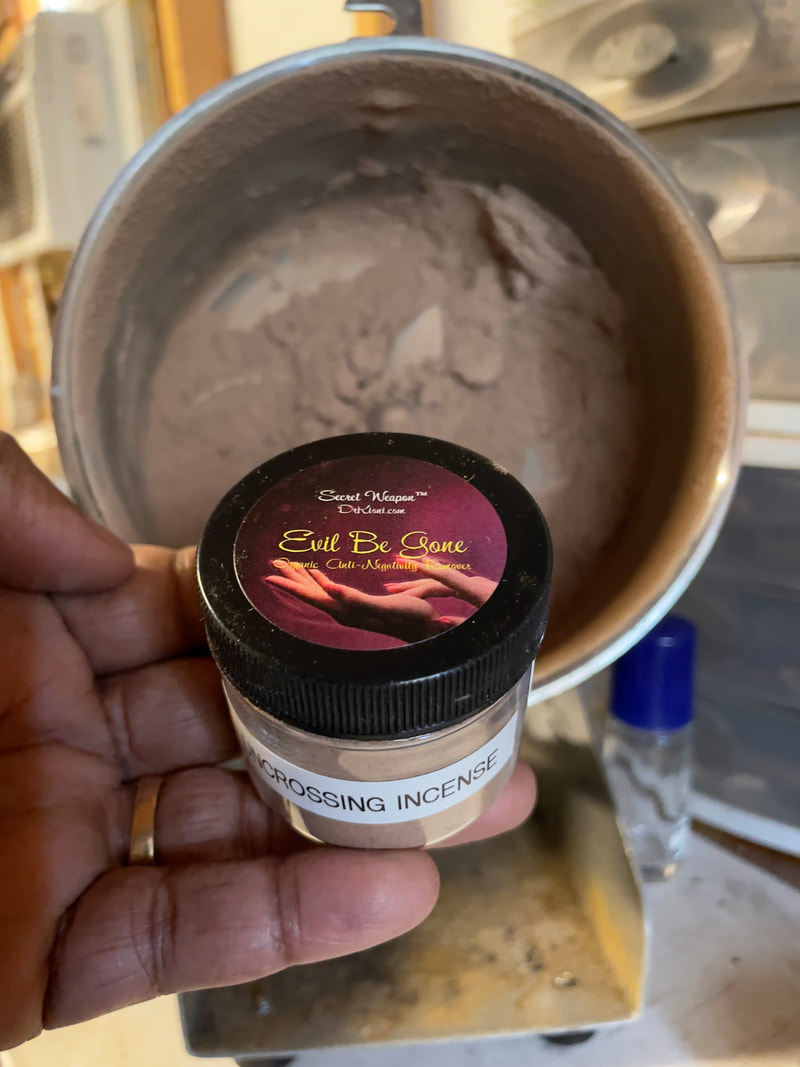 Chief Dr. Kioni @ Oke-Itase Chief Dr. Kioni @ Oke-Itase Why African Americans Are Afraid to Embrace African Spirituality? By Chief Dr. Kenneth Fuller ©️2024 This question touches on a complex and multifaceted topic that involves personal beliefs, cultural identity, historical context, and individual experiences. It is vital to approach this subject with sensitivity and respect for diverse perspectives. The reasons why some African Americans may be hesitant to openly embrace African Traditional Religions (ATRs) while privately engaging in practices like hoodoo aka African American Herbal Magic can vary and are not universal among all individuals. However, here are a few factors that may contribute to this phenomenon: 1. Historical Trauma: The history of African Americans in the United States is marked by slavery, oppression, and the forced erasure of African cultural practices. During slavery, Africans were stripped of their religious and cultural identities, and their traditional spiritual beliefs were often demonized or suppressed. This traumatic history may have created a disconnect between African Americans and their ancestral African religions, leading to a sense of fear or reluctance to embrace them openly. 2. Cultural Assimilation: Over time, African Americans have assimilated into American society, adopting Christianity as their dominant religion. The influence of Christianity, combined with societal pressures to conform, may have led to a distancing of African Traditional Religions among some African Americans. There could be a fear of being seen as deviating from the dominant religious norms and facing social judgment or stigmatization. 3. Stigma and Misconceptions: African Traditional Religions, including practices like hoodoo, have often been misunderstood and stigmatized in mainstream society. This negative perception can create a sense of fear or shame among African Americans who may be interested in exploring their ancestral religions. This fear of judgment or discrimination may lead individuals to practice these traditions secretly to protect themselves from potential backlash. 4. Personal Beliefs and Preferences: It is essential to remember that religious beliefs and practices are deeply personal and can vary widely among individuals. Some African Americans may simply have different spiritual beliefs or preferences that do not align with African Traditional Religions. Each person's spiritual journey is unique and should be respected. It is important to note that there is a growing interest among some African Americans in reconnecting with their African roots and exploring African Traditional Religions. Many individuals are actively seeking knowledge, engaging in cultural exchange, and embracing their ancestral traditions. However, the decision to openly practice or embrace any religious or spiritual belief is a personal one and should be respected without judgment or assumptions. In conclusion, the reasons why some African Americans may be hesitant to openly embrace African Traditional Religions while engaging in practices like hoodoo or African American Herbal Magic can be influenced by historical trauma, cultural assimilation, stigma, misconceptions, and personal beliefs. It is crucial to approach this topic with empathy, understanding, and respect for individual choices and experiences. How does cultural assimilation affect African Americans' willingness to openly practice ATRs? Cultural assimilation can have a significant impact on African Americans' willingness to openly practice African Traditional Religions (ATRs). Here are a few ways in which cultural assimilation can influence their decision: 1. Dominance of Christianity: Christianity has historically been the dominant religion among African Americans, largely due to the influence of European colonization and the enslavement of Africans in America. As a result, many African Americans have adopted Christianity as their primary religion and have been socialized within Christian communities. The pressure to conform to the dominant religious culture can make it challenging for individuals to openly practice ATRs, which may be seen as deviating from or contradicting Christian beliefs. 2. Religious Upbringing and Family Dynamics: African Americans who have been raised in Christian households and communities may face resistance or disapproval from their family members if they openly practice ATRs. Family dynamics and the desire to maintain familial harmony can influence individuals to keep their ATR practices private. The fear of disappointing or conflicting with the religious beliefs of their loved ones can be a significant factor in choosing to practice ATRs secretly. 3. Cultural Erasure and Disconnection: The historical erasure of African culture, traditions, and religions during slavery and colonialism has had a lasting impact on African Americans' connection to their ancestral religions. The loss of knowledge, rituals, and practices due to forced assimilation has made it challenging for some individuals to openly practice ATRs. The lack of cultural connection and limited access to resources can create a barrier to openly embracing and expressing these beliefs. 4. Social Stigma and Discrimination: African Traditional Religions have often been stigmatized and misunderstood in mainstream society. The negative stereotypes and misconceptions surrounding ATRs can lead to social judgment, discrimination, or backlash if individuals openly practice these religions. The fear of facing social or professional ramifications, such as being ostracized or discriminated against, may lead some African Americans to keep their ATR practices hidden. 5. Desire for Acceptance and Belonging: Cultural assimilation can create a desire for acceptance and a sense of belonging within mainstream society. Some African Americans may feel pressure to conform to societal norms and expectations, including religious practices. This desire for acceptance and fear of being seen as "different" or "other" can discourage individuals from openly embracing ATRs. It's important to note that not all African Americans who engage in ATRs choose to practice them secretly. There is a growing movement of African Americans who are reconnecting with their African roots and openly practicing ATRs. However, the influence of cultural assimilation and the factors mentioned above can impact an individual's willingness to openly express their ATR beliefs and practices. Creating a safe and inclusive environment that respects diverse religious and spiritual beliefs is crucial to supporting individuals who may choose to practice ATRs openly.
0 Comments
Yemoja is considered a protective deity in the Yoruba religion of Ifa. She is believed to watch over her devotees and offer them emotional support, guidance, and healing. Yemoja is often invoked for protection against hostile forces, harm, and evil spirits. She is seen as a compassionate and nurturing figure who provides security and safety to those seeking her help. |
There are several different types of incense available in the market, each with its unique fragrance and purpose. Here are some popular types: |
Author
Dr. Christos Kioni
Archives
July 2024
June 2024
May 2024
April 2024
March 2024
February 2024
January 2024
January 2023
April 2022
March 2022
March 2020
February 2020
September 2019
August 2019
May 2019
November 2018
October 2018
December 2017
July 2017
June 2017
April 2017
January 2016
November 2015
October 2015
September 2015
August 2015
April 2015
March 2015
February 2015
January 2015
October 2014
May 2014
August 2013
May 2013
April 2013
March 2013
January 2013
November 2012
March 2012
Categories
All
African Dispora
Bible
Christianity
Dr Kioni
Folk Magic
Hoodoo
Hoodoo Conjure
Lucky Charms
Magick Spells
Myhoodoospace
Occult Amulets
Roots
Rootwork
Rootworker
Sangoma
Zulu


 RSS Feed
RSS Feed